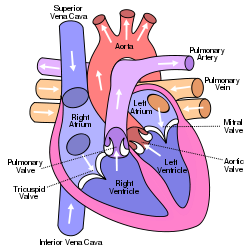Mitral regurgitation surgery
|
Mitral regurgitation surgery | |
|
Treatment | |
|---|---|
|
Mitral regurgitation surgery On the Web | |
|
American Roentgen Ray Society Images of Mitral regurgitation surgery | |
|
Directions to Hospitals Performing Mitral regurgitation surgery | |
|
Risk calculators and risk factors for Mitral regurgitation surgery | |
For the WikiPatient page for this topic, click here
For the main page of mitral regurgitation, click here
Editor-In-Chief: C. Michael Gibson, M.S., M.D. [1]; Associate Editor(s)-In-Chief: Mohammed A. Sbeih, M.D. [2]; Cafer Zorkun, M.D., Ph.D. [3]; Varun Kumar, M.B.B.S.; Lakshmi Gopalakrishnan, M.B.B.S.

Overview
Treatments for Mitral valve regurgitation
The choice of treatment depends on the symptoms present and the condition and function of the heart. Patients with high blood pressure or a weakened heart muscle may be given medications to reduce the strain on the heart and help improve the condition.
Anticoagulant or antiplatelet medications (blood thinners) may be used to prevent clots from forming in patients with atrial fibrillation.
Digitalis may be used to strengthen the heartbeat, along with diuretics (water pills) to remove excess fluid in the lungs.
A low-sodium diet may be helpful. Most people have no symptoms; but if a person develops symptoms, activity may be restricted.
Hospitalization may be required for diagnosis and treatment of severe symptoms. Surgical repair or replacement of the valve is recommended if heart function is poor, symptoms are severe, or the condition gets worse. Once the diagnosis of mitral regurgitation is made, the patient should have regular follow-ups with a specialist to determine whether he or she need surgery.
In the past, patients with heart valve problems such as mitral regurgitation were given antibiotics before dental work or an invasive procedure, such as colonoscopy. The antibiotics were given to prevent an infection of the damaged heart valve. However, antibiotics are now used much less often before dental work and other procedures.
Indications
Preoperative Evaluation
Procedure
Recovery
Surgical outcome
The results of mitral valve repair are excellent in the centers that regularly perform this surgery.
Techniques for minimally invasive heart valve surgery have improved greatly over the past 10 years. These techniques are safe for most patients, and they reduce recovery time and pain.
Valve repair versus valve replacement
Advantages of Mitral valve repair include:
- Lower operative mortality rate [1][2]
- Improves left ventricular EF and function [3].
- Preserves native heart valve and avoids the use of a prosthetic heart valve with its complications.
- Has good overall outcome with good survival rates [4][5][6].
- Lower risk for endocarditis.
- Avoids long term use of anticoagulants.
Mechanical versus Biological valves
Mechanical heart valves do not fail often. They last from 12 to 20 years. However, blood clots develop on them. If a blood clot forms, the patient may have a stroke. Bleeding can occur, but this is rare. Biological valves tend to fail over time [7][8], but they have a lower risk of blood clots.
Possible complications
Risks for any surgery
- Blood clots in the legs that may travel to the lungs.
- Blood loss.
- Breathing problems.
- Infection, including in the lungs, kidneys, bladder, chest, or heart valves.
- Reactions to medicines.
Possible risks from having open-heart surgery
- Heart attack or stroke.
- Heart rhythm problems.
- Infection in the cut, which is more likely to happen in people who are obese, have diabetes, or have already had this surgery.
- Memory loss and loss of mental clarity, or "fuzzy thinking."
- Post-pericardiotomy syndrome, which is a low-grade fever and chest pain. This could last for up to 6 months.
Prosthetic heart valves are associated with a variety of complications
- Structural deterioration, particularly with bioprosthetic valves.
- Valve obstruction due to thrombosis or pannus formation.
- Systemic embolization.
- Bleeding.
- Endocarditis and other infections.
- Left ventricular systolic dysfunction, which may be preexisting.
- Hemolytic anemia.
Videos
- Minimally invasive mitral valve surgery (Right thoracotomy approach video)
<youtube v=EnJQh_W3r3A/>
- Robotic mitral valve repair surgery animation-(1)
<youtube v=VrIxRfWDOm8/>
- Robotic mitral valve repair surgery animation-(2)
<youtube v=GYAmSH2zwic/>
External links
http://en.wikipedia.org/wiki/Mitral_valve#cite_note-0
http://www.nlm.nih.gov/medlineplus/ency/article/000176.htm
http://www.nhlbi.nih.gov/health/health-topics/topics/hs/before.html
http://www.mayoclinic.org/mitral-valve-disease/
http://www.nlm.nih.gov/medlineplus/ency/article/007411.htm
http://www.nhlbi.nih.gov/health/health-topics/topics/hs/during.html
http://www.nhlbi.nih.gov/health/health-topics/topics/hs/after.html
References
- ↑ Tribouilloy CM, Enriquez-Sarano M, Schaff HV, Orszulak TA, Bailey KR, Tajik AJ; et al. (1999). "Impact of preoperative symptoms on survival after surgical correction of organic mitral regurgitation: rationale for optimizing surgical indications". Circulation. 99 (3): 400–5. PMID 9918527.
- ↑ Krayenbuehl HP (1986). "Surgery for mitral regurgitation. Repair versus valve replacement". Eur Heart J. 7 (8): 638–43. PMID 3769948.
- ↑ Enriquez-Sarano M, Schaff HV, Orszulak TA, Tajik AJ, Bailey KR, Frye RL (1995). "Valve repair improves the outcome of surgery for mitral regurgitation. A multivariate analysis". Circulation. 91 (4): 1022–8. PMID 7850937.
- ↑ Lee EM, Shapiro LM, Wells FC (1997). "Superiority of mitral valve repair in surgery for degenerative mitral regurgitation". Eur Heart J. 18 (4): 655–63. PMID 9129898.
- ↑ Mohty D, Orszulak TA, Schaff HV, Avierinos JF, Tajik JA, Enriquez-Sarano M (2001). "Very long-term survival and durability of mitral valve repair for mitral valve prolapse". Circulation. 104 (12 Suppl 1): I1–I7. PMID 11568020.
- ↑ Thourani VH, Weintraub WS, Guyton RA, Jones EL, Williams WH, Elkabbani S; et al. (2003). "Outcomes and long-term survival for patients undergoing mitral valve repair versus replacement: effect of age and concomitant coronary artery bypass grafting". Circulation. 108 (3): 298–304. doi:10.1161/01.CIR.0000079169.15862.13. PMID 12835220.
- ↑ Hammermeister KE, Sethi GK, Henderson WG, Oprian C, Kim T, Rahimtoola S (1993). "A comparison of outcomes in men 11 years after heart-valve replacement with a mechanical valve or bioprosthesis. Veterans Affairs Cooperative Study on Valvular Heart Disease". N Engl J Med. 328 (18): 1289–96. doi:10.1056/NEJM199305063281801. PMID 8469251.
- ↑ Hammermeister K, Sethi GK, Henderson WG, Grover FL, Oprian C, Rahimtoola SH (2000). "Outcomes 15 years after valve replacement with a mechanical versus a bioprosthetic valve: final report of the Veterans Affairs randomized trial". J Am Coll Cardiol. 36 (4): 1152–8. PMID 11028464.